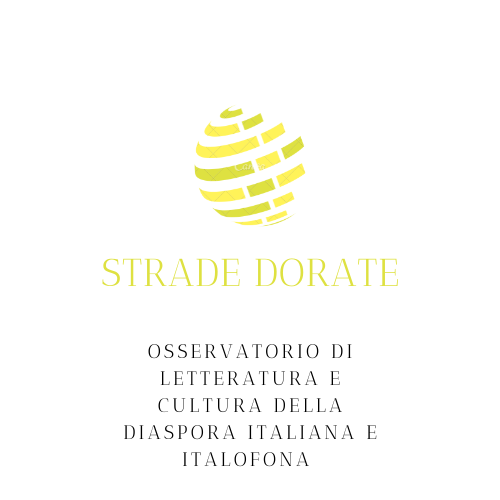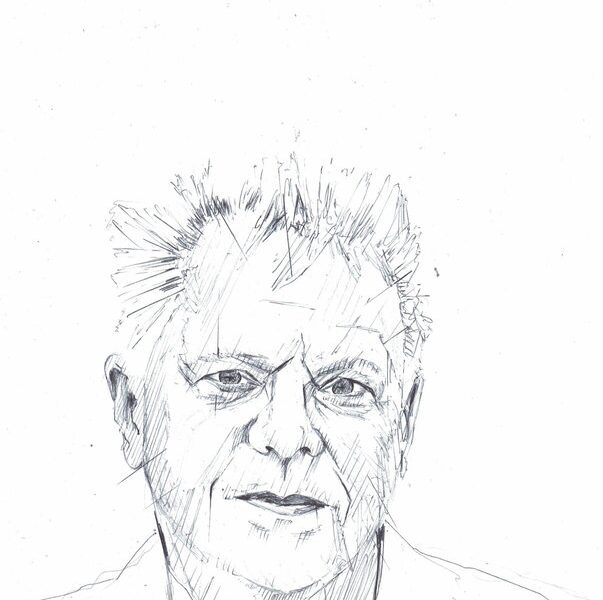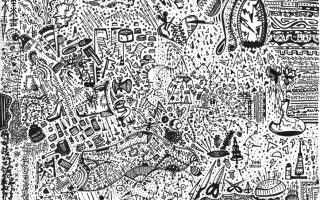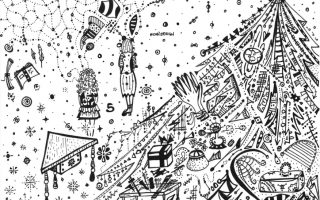by ROSA AMATULLI
Charles Cantalupo’s work has received support from the Ford and Rockefeller Foundations and the World Bank. He is the author of four books of translations of Eritrean poetry; four books of literary criticism ranging from Thomas Hobbes to Ngũgĩ wa Thiong’o; and a memoir, Joining Africa – from Anthills to Asmara. His two most recent books include a collection of his essays, Non-Native Speaker, and a fourth book of his own poetry, The Woodstock Sandal and Further Steps. Distinguished Professor of English, Comparative Literature, and African Studies at Penn State, he is a co-author of the historic Asmara Declaration on African Languages and Literatures, which was ratified at “Against All Odds,” the conference and festival that he co-chaired in Asmara, Eritrea, in 2000. He is completing a new book of poetry, An Eritread, based on his co-translation of atrocity of war stories from the Eritrean revolution.
R. Amatulli: Dear Professor Cantalupo, thank you so very much for accepting this interview, on behalf of Stade Dorate, a project committed to promoting, in Italy, the literature and culture of Italian American artists and authors living in the United States. It is indeed a great honor to be speaking with you, about your background and your work. Since it is the primary aim of this interview to learn about Italian American authors, I will begin by asking you to please talk about your Italian American background and your relationship with Italy and its culture.
C. Cantalupo: I’m happy to speak with you. I’ve rarely been asked about my writing in relation to my Italian ethnic origins. My grandfather was an immigrant from Altomonte in the south of Italy. Departing from Naples on a large ship named the “Scotia,” he arrived on Ellis Island, June 15, 1894, and later he married my grandmother in New York City. Settling in Newark, New Jersey, he was a barber and a musician, and my grandparents had a large family. Two of their sons became attorneys. My father, Charles Cantalupo Jr. (I’m the 3rd) assimilated well into American culture, even though his parents spoke Italian, ate Italian food, and lived in an Italian neighborhood. It wasn’t until I went to Italy when I was a student at the University of Canterbury, in the Spring of 1972, that I became excited about Italian culture: so much so that based on that experience I compelled my father to start drinking Italian wine again instead of scotch and my mother to cook with olive instead of peanut oil. Also, I insisted that they travel to Rome and meet me. This was my father’s first trip to Italy, and he loved it.
For the next fifteen years I continued to study Italian culture and literature. I went back to Rome frequently and became obsessed with Italian and European cultures and literatures, too. American literature is great, of course, and I’m nothing if not an American poet and scholar, but I don’t feel particularly close to traditional American literature, with the notable exception of Edgar Allan Poe and some 20th-century American poets, many of whom were my professors. But from my first visit to Renaissance Florence when I saw the statue of Dante outside Santa Croce to a recent visit when I first beheld the monument to Petrarch in Arezzo, I’ve been deeply touched. Their work is vital to me. Furthermore, their embrace of the vernacular in their work is also fundamental to my research and writing on African literature, particularly on African literature in African languages.
R. Amatulli: You are a very accomplished college professor, a poet, a translator, and a scholar in African literature and culture, but you are also an Italian American. Have you ever experienced any form of hardship because of your background, and what does it mean for you to be “Italian-American”?
C. Cantalupo: No. I haven’t experienced much hardship, and I don’t dwell on it. All the jokes about my last name, Cantalupo; people not taking me seriously as a writer because they don’t know that a “Cantalupo” is a Singing Wolf! But seriously, even my work in African literature raises comments about whether someone like me should be doing it, since I’m not African. I don’t let these things bother me. Can you imagine someone questioning Yo-Yo Ma because of his name or ethnicity since he plays Bach? Regardless, I was born and raised in New Jersey, where people who come from different parts of the world are legion: where being an immigrant and/or a first or second generation American is natural and the norm. My father is of Italian descent, my mother Ukrainian. My wife is half Sicilian, half Ukrainian. We joke about our similar backgrounds. Were we seeking some kind of ethnic purity in each other, although we didn’t realize we were actually so close until after we fell in love? Yet as an Italian American, I’m an American in the fullest. I love American culture and would live nowhere else, even though I make connections with a larger cultural context that is manifest in what I write.
R. Amatulli: You have a truly multicultural background. Given that speaking about Italian Americans is to speak about Italian migrants whose identity is impacted by the American culture, would you please explain what is identity for you?
C. Cantalupo: I think of identity as a spectrum rather than a fixed point. My grandparents on both sides spoke little English. I preferred and have cultivated the Italian – in manners and culture. This is a deliberate choice, and I could have chosen my other side. Italian and Ukrainian? I’m literally (and genetically) no more one than the other. Reasons why I chose to identity Italian rather than Ukrainian can range from simply having my Italian father’s last name to Italian culture’s greater visibility – from arts and letters to gastronomy – than Ukraine’s, both in American and Europe. I would say, however, that choosing one’s identity is not unusual in America. Even our former president, Barack Obama, did it, coming from a biracial marriage and deciding to identity as black, although racial distinctions raise a lot more issues than ethnic. I meet people from all walks of life who identify more with one than the other side of their ethnic heritage. Identity might even be considered like a fraction, a numerator, with American nationality as a denominator. Yet depending on how many generations a particular family has been in America, the nominator usually becomes smaller and smaller.
Since the mid-1980s, I have gravitated towards Africa, mainly the Horn. It’s a truism to say that all human beings evolved from the Rift Valley in Eastern Africa millions of years ago, but over the years I’ve grown close to people and cultures in the Horn. In my new book, The Woodstock Sandal and Further Steps, the final poem, “Minor Origins,” is precisely about that, taking place in the ruins along the Red Sea of the ancient city of Adulis, which was highly multicultural. The poem begins, “Not DNA or the parents, parents’ parents – that kind of bloodline. / I mean the mind – hence the “minor” – I can embrace as my own” (83). My grandfather left Altomonte and chose to immigrate west. A little less than a century later, I went east, not so much out of material as cultural necessity. Still, I followed a wave of Italian immigration from my grandfather’s time of those who went not to America but to Africa: Libya, Ethiopia, Eritrea. Then again, those Italian immigrants to Africa, my grandfather to America, me to Africa – many people make such choices and, as we know, more people than ever now as populations are on the move all over the world. I’m arguing, therefore, that we take into greater account than before the nature and effects of such choices, and that they are an ever more profound resource of new knowledge. There’s the wonderful saying, “All roads lead to Rome.” But consider the vast variety of people of different cultures who followed those roads to Rome and similarly traveled them away from Rome. It’s been a center, yet it’s also been a crossroads. Take into account its comprehensive cultural legacy and how it has spread through the world: in the arts, religion, philosophy, history, and more. Yet a legacy translated over and over again into so many different languages. I would like a word for that identity.
R. Amatulli: Identity is indeed a very complex concept. Thank you for your thoughtful observations. Now on to the next question. Your book, Joining Africa, tells the story of how you became involved in Africa and became the public voice and translator of Eritrean poetry. How did you come about to cultivate such a great passion for a place that is so complex?
C. Cantalupo: Throughout a lot of my work, I write about the process of learning or knowing: my mistakes, my ignorance, what I have not known, and then the experience of becoming better informed. I first visited Europe in 1972. It immediately overwhelmed me, and I became obsessed with all the beauty and culture that I saw and never knew. I reveled in it all like a young Edward Casaubon, the character from George Eliot’s novel, Middlemarch, who aspires to an understanding that encompasses all knowledge. For the next fifteen years I woke, slept, read, wrote European culture inside and out.
Casaubon, of course, failed in his quest. In my case I went to Egypt and realized that my studies, my writing, my travels, my knowledge, my teaching – all of it – still did not prepare me for the immense beauty, culture, and art that I found there. Yet while I was so suddenly astounded, I also felt personally and intellectually vulnerable. I thought, “why continue my intellectual pilgrimage only to Europe and not include Africa?” And so, I began to explore a few African countries. The more I studied, researched, and wrote on African culture, the more I realized that there were numerous cross currents that ran through America, Europe, and Africa. Yet a similar dynamic applies to learning about America. To study America means beginning to understand the relationship that ties it to Europe, Africa, and the rest of the world.
When I realized that knowledge and culture are made of relationships and links among many different pieces and places of knowledge, I also realized that my learning about European cultures could connect to Africa, too. This is how my American-European-African journey began. Another way to conceive of this process is that it reverses, at least in relation to Europe and Africa, the intellectual journey of St. Augustine. He went from Africa to Rome. “Veni Karthaginem,” as he famously writes in his Confessions. My journey was from Rome to Africa. “I came to Carthage from the other direction, / From Rome back to Rome’s Rome,” as I write in one of my poems, “Newark, Cairo, Dakar, Nairobi, Asmara, Home” (Joining Africa 261).
R. Amatulli: Your phrase, “Rome’s Rome” appears in Joining Africa when you write about Italian art and architecture in Eritrea. You write, “Rome’s Rome—yes–a cultural continuum between Europe and Africa: but not the setting up of yet one more kind of cultural superiority to replace another” (111). Would you please explain what you mean?
C. Cantalupo: After what I’ve told you about my cultural – what should I call it: journey, pilgrimage, transition? – from America to Europe to Africa, such an assertion seems predictable. In the context of my memoir, the idea appears when I’m describing the first time I was in Asmara, Eritrea, which was in 1995. Declared a UNESCO World Heritage site in 2017, Asmara is filled with Italian Modernist architecture in the form of theatres, churches, government buildings, hotels, shops, apartments, even gas stations, and more. At the same time, the city has many varied and vibrant local neighborhoods. The combination, the “mista,” is extraordinary. At this point I would almost say seamless, the undeniable brutality that came with Italian colonialism notwithstanding. Yet for all the signage and small talk in Italian, the original Fiat Seicentos parked on the street, the bells tolling in the Franciscan cathedral, the barbershops that looked like my grandfather’s, the Eritrean who looked like he could have been my father’s brother making me a provolone and prosciutto sandwich at the alimentari: I still knew I was in Africa, and in its brightest newest nation. Most of the signs and most conversations were in the African language of Tigrinya – in Ge’ez script no less. Many walls were still pockmarked with the gunfire of Eritrea’s 30-year armed struggle independence that had just ended a few years before. My first few days were spent browsing in bookstores filled with African books, speaking with the authors who were writing Eritrea’s new Constitution, and visiting the Martyrs Cemetery and Tsetserat, the vast tank and armaments “graveyard” where weapons from both sides of the Cold War rusted into oblivion.
On a personal level, my decades of traveling to Europe and always ending up in Rome now led me to Asmara. It was spiritual, too. That year I came to Eritrea from Israel, where I had been attending a conference that billed itself on African languages “Breaking the Boundaries: Beyond the Land of Kush.” At the same time, I was reading the Kebra Nagast, an Ethiopian Orthodox text that recounted how the biblical Ark of the Covenant was transported from Jerusalem to Axum by the son of the Queen of Sheba, Menelik, whose biological father was Solomon.
During Italian colonial times, Asmara was called “Piccola Roma.” But other than in physical size, I found nothing “piccolo” about it. I was in a place where all the Gods of the Red Sea, literally within 100 kilometers away – Judaism, Christianity, Islam, Zoroastrianism, and more – had emerged and first walked, and from where their ideas and images subsequently spread to Europe, America and, of course, the world. So, yes, Asmara was a kind of Rome’s Rome for me.
R. Amatulli: Thank you. That is truly all very interesting. Now on to the next question: do you have a favorite Italian author? Who is that, and what do you think of his or her work?
C. Cantalupo: Oh yes! Dante is by far my favorite Italian author. Reading Dante changed my life. When I was seventeen years old, I began college in St. Louis, Missouri, at Washington University. In those years we were protesting against the Vietnam war, and against President Lyndon Johnson. We were challenging and losing our religion, and we were experimenting with psychedelics. There was not one single thing that we did not challenge during that time. Then I read Dante. He astounded me like no one ever did before. He not only challenged, criticized, and resisted every cultural institution, tradition, and convention around him. He also affirmed. No pillar of culture went unscathed. Every pillar of culture was reinforced. And he became a pillar himself. Not only did he put nearly everyone he knew in hell; he also said it in rhyme, in terza rima. Wow!
Over the years, I’ve written a lot of terza rima myself, only in English, of course: for example, “Columba, the Dove,” published in my book of poetry, Light the Lights (2004). Dante’s form seemed right for a long poem that commemorated the 500th anniversary, in 1992, of Columbus’ arrival in America and emotionally the death of my father in 1993. Two Italians; two voyages; two finales. In the case of the Genoan explorer, he had been popularly terminated as a hero to be condemned as a progenitor of the brutal history of European colonialism. To write the poem, however, I visited sites in the Caribbean and in West Africa; for example, western Puerto Rico and Gorée Island in Senegal, famous as places of European colonial terror and exploitation. I focused on the life that flourished there many centuries later so that, as the poem tried to express, the “colomba,” the dove, a symbol of peace and reconciliation, might ultimately prevail.
Dante was the first poet who inspired me to risk writing poetry that partook of epic. Reading him revealed a universe of art, poetry, politics, and more than I ever knew before. Frankly, I’m still trying to work out his influence in my own work. Nevertheless, Dante was not the very beginning of my cultural journey – my book, The Woodstock Sandal and Further Steps, reveals what was! But as Virgil was to him, he was to me.
R. Amatulli: Thank you very much. You have written four books of poetry, and you have translated four books of Eritrean poetry. What is poetry for you, and why is it important for the soul?
C. Cantalupo: That’s a question I almost wish you didn’t ask because poetry is so various, even in the same time period. I often return to William Wordsworth’s “Poetry is the spontaneous overflow of powerful feelings: it takes its origin from emotion recollected in tranquility.” The statement pulls in several directions, the way a good poem does. For me a good poem is a distinctive form of language, meaning, emotion, music, and memory all at once. “Performance” is a concept that is also vital to poetry, connecting it to poetry’s origins in orality.
When I was thirteen years old, I wrote my first poem that became popular: a protest song about the Vietnam war. Performing this work and seeing the audience respond became a unique and unforgettable experience that has inspired me ever since. If people were telling me my work meant something special to them, how could I ever stop? But I wasn’t a literary young man. I was a musician and interested mostly in playing twelve-string guitar in a rock and roll group. This has a lot to do with my thinking of poetry as the most intense language with the most intense music. And this is what came chronologically before I read Dante and what I write about, as I’ve said, in my poem, “The Woodstock Sandal,” in my eponymously titled book. That poem, too, is more in a narrative and epic genre than lyric.
Currently I have a work in progress that is a book of poems based on stories of war atrocities in Eritrea. I helped translate the stories, which originated as prose narratives in Tigrinya based on eye-witness accounts. Translating them was a very difficult and depressing task because the stories were so brutal and horrific. When I finished the project, however, I decided to rewrite them as epic poems, in the sense that I used the dactylic hexameter of Homer, of Latin, of Virgil, with an American adaptation. But also, in the process of writing these poems, I recognized that I was connecting with the long tradition in practically all the literatures of the world of oral literature or orature. Yet that was not my plan, and I didn’t even realize that when I started. It just happened. In fact, the impetus for rewriting the prose translations as poems was that the emotions in the prose stories were so strong that I couldn’t rest until I rewrote them as poems to express that.
If poetry like that is not a connection to the soul, I don’t know what is. This may not sound particularly theological, although I should confess at this point that when French literary theory of Derrida and Foucault were all the rage in the 1980s and 90s, I was immersing myself in theology: Augustine, Bernard of Clairvaux, and moderns like Teilhard de Chardin and Karl Rahner.
Yet poetry is as much an emotional and even phenomenological process as aesthetic and intellectual precisely because of its rhythm or music: a sine qua non of the poetry I value most. In American poetry, Edgar Allan Poe is the greatest if also a rare proponent of this viewpoint. Music can seem like a kind of drug, effecting the mind and the body as well; making us laugh or cry; shout or brood; changing our moods. A stark example of this is to watch a video of dance with the music turned off. What are people doing? Accompany music – whatever the music — with language, even to a point of not knowing the language, as in operas or religious music for example, or even when one can’t quite understand the words of the song. The music can still possess our very souls. To go further, to recognize the poem’s distinctive form of language, meaning, emotion, music, and memory all at once is why I write poetry and why I read it.
R. Amatulli: Well, thank you so very much. I am speechless. More than a conversation, this has been a lecture on identity, Roman and African cultures, history, and knowledge; truly interesting and fascinating. Your work is truly captivating. Thank you. Auguri on your current and future projects.
C. Cantalupo: Grazie infinite.
(On the cover: illustration by Massimo Carulli)
You can read it in italian by clicking here




